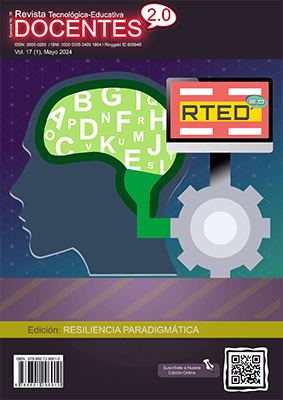Proposal of Strategies for Continuous Improvement in the Use of The Facebook Social Network
 DOI:
https://doi.org/10.37843/rted.v17i1.457
DOI:
https://doi.org/10.37843/rted.v17i1.457
Main Article Content
Abstract
Technology has integrated social networks into education, generating benefits to the educational process, such as optimizing communication in the teaching-learning process, involving students in activities, and facilitating access to information, thus improving the learning experience. The study had the objective of analyzing the didactic strategies for continuous improvement in the use of the social network Facebook in 10th-grade students of the Las Nieves District Educational Institution to integrate Facebook into the main axis of social interaction among students to improve academic success, communication with their teachers and family support in the institution by allowing the correct formation of their digital competences. The inquiry was immersed in the interpretative paradigm, located in the qualitative approach of the analytical type, with the bibliographic design of the documentary type being the unit of analysis of the bibliographic sources analyzed and cited in the study. Among its results, the importance of using social networks in the classroom was evidenced; therefore, it was concluded that Facebook had opened a range of possibilities of strategies, methodologies, learning, and multiple means of accessing knowledge at any time and place, which allowed the educational community to create a suitable environment in the implementation of continuous improvement strategies. Likewise, it was recommended that didactic strategies for continuous improvement using the social network Facebook be proposed to 10th-grade students of the I.E.D. Las Nieves.
Downloads
Metrics
Article Details

This work is licensed under a Creative Commons Attribution-NonCommercial-NoDerivatives 4.0 International License.
Those authors who have publications in our journal accept the following terms:
- When a work is accepted for publication, the author retains rights of reproduction, distribution of his/her article for exploitation in all countries of the world in the format provided by our magazine and any other magnetic medium, optical, and digital.
- Authors will retain their copyright and guarantee the journal the right first to publish their work, which will be simultaneously subject to the Creative Commons Acknowledgment License (Attribution-NonCommercial-NoDerivatives 4.0 International (CC BY-NC-ND 4.0)). That allows third parties to copy and redistribute the material in any medium or format, under the following conditions: Acknowledgment - You must properly acknowledge authorship, provide a link to the license, and indicate if any changes have been made. You may do so in any reasonable way, but not in a way that suggests you have the licensor's endorsement or receive it for your use. NonCommercial - You may not use the material for a commercial purpose. NoDerivatives - If you remix, transform, or build from the material, you cannot broadcast the modified material. There are no additional restrictions - You cannot apply legal terms or technological measures that legally restrict you from doing what the license allows.
- Authors may adopt other non-exclusive license agreements to distribute the published version of the work (e.g., deposit it in an institutional archive or publish it in a monographic volume) provided that the initial publication in this journal is indicated.
- Authors are allowed and recommended to disseminate their work through the Internet (e.g., in institutional telematic archives, repositories, libraries, or their website), producing exciting exchanges and increasing the published work's citations.
- Request of withdrawal an article has to be done in writing by the author to the Editor, becoming effective after a written response from the Editor. For this purpose, the author or authors will send correspondence via e-mail: [email protected].
- The author will not receive financial compensation for the publication of his work.
- All Docentes 2.0 Journal publications are under the Open Journal System (OJS) platform at: https://ojs.docentes20.com/.
References
Andrade, J. (2018). Las redes sociales. Jerl Edit.
Bosada, M. (2018). El reto de personalizar el aprendizaje con ayuda de las TIC. D. F. Educa.
Costa, C., Idrobo, M., Valle, M., & Ramón, I. (2022). Practicas educacionales, innovadoras y efectivas para el proceso enseñanza y aprendizaje en la educación básica. Ciencia Latina Revista Científica Multidisciplinar, 19-38. https://doi.org/10.37811/cl_rcm.v6i5.3390 DOI: https://doi.org/10.37811/cl_rcm.v6i5.3390
De la Cruz, C., Cortez, P., & Fernández, R. (2017). Importamcia de la Red Social Facebook para impulsar el Aprendizaje Colaborativo en Educación Superior. https://n9.cl/wblgz
Intriago, G., & Rodríguez, A. (2022). Estrategias didácticas para la atención en escolares con necesidades educativas especiales durante el Covid-19. Un estudio de revisión en Ecuador. Tesla Revista Científica, 32-52. https://doi.org/10.55204/trc.v3i1.e92 DOI: https://doi.org/10.55204/trc.v3i1.e92
López, J., Ramírez, C. Zuluaga, M., & Ortiz, J. (2010). El método analítico. Revista de Psicología Universidad de Antioquia, 2(2). https://hdl.handle.net/10495/5501
Lorenzo, C., Gómez, M., & Alarcón, M. (2019). Redes Sociales Virtuales. Universidad de Castilla-La Mancha.
Paco, F. (2017). La red social Facebook y su incidencia en el trato y tráfico. En estudiantes de secundaria de la Unidad Educativa Fabril 18 de mayo de la Ciudad de La Paz. Universidad Mayor de San Andrés. https://n9.cl/o3fhy
Padilla, M. (2022). Estrategias didácticas para el fomento de una cultura ambiental sostenible. Cienciamatria, 25-44. DOI 10.35381/cm.v8i3.918
Palella, S., & Martins, F. (2012). Metodología de la Investigación Cuantitativa. Fedupel.
Pérez, L., Tapia, M., Justo, S., & Miranda, F. (2022). La mejora continua de la educación. Principios, marco de referencia y ejes de actuación. MEJORED.
Piñero, M., & Rivera, M. (2013). Investigación Cualitativa, Orientaciones Procedimentales. UPEL-IPB.
Reyes, R. (2021). Estrategias didácticas innovadoras para mejorar el desempeño docente. Journal of Latin American Science, 13-29. DOI:10.46785/lasjournal.v5i2.108 DOI: https://doi.org/10.46785/lasjournal.v5i2.108
Taylor, S., & Bogdan, R. (1986). Introducción a los Métodos Cualitativos de Investigación. Paidós Ibérica Ediciones, S.A. https://n9.cl/4f8sk
Torres, R. (2017). Enseñanza problémica o Aprendizaje basado en problemas: una estrategia didáctica aplicada a los estudiantes de Ingeniería Civil. Philosophy, 17-39. https://doi.org/10.26490/uncp.horizonteciencia.2020.19.595 DOI: https://doi.org/10.26490/uncp.horizonteciencia.2020.19.595
Unesco. (2022). Qué necesita saber acerca del aprendizaje digital y la transformación de la educación. https://n9.cl/rqzof
Universidad Internacional de la Rioja. (2023). ¿Qué son las estrategias didácticas? Concepto, importancia y ejemplos. https://n9.cl/jeraz
Vargas, G. (2020). Estrategias educativas y tecnología digital en el proceso enseñanza aprendizaje. Cuadernos Hospital de Clínicas, 69-75. https://n9.cl/e3mlp






